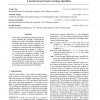Free Online Productivity Tools
i2Speak
i2Symbol
i2OCR
iTex2Img
iWeb2Print
iWeb2Shot
i2Type
iPdf2Split
iPdf2Merge
i2Bopomofo
i2Arabic
i2Style
i2Image
i2PDF
iLatex2Rtf
Sci2ools
101
click to vote
ICML
2007
IEEE
2007
IEEE
A kernel-based causal learning algorithm
We describe a causal learning method, which employs measuring the strength of statistical dependences in terms of the Hilbert-Schmidt norm of kernel-based cross-covariance operators. Following the line of the common faithfulness assumption of constraint-based causal learning, our approach assumes that a variable Z is likely to be a common effect of X and Y , if conditioning on Z increases the dependence between X and Y . Based on this assumption, we collect "votes" for hypothetical causal directions and orient the edges by the majority principle. In most experiments with known causal structures, our method provided plausible results and outperformed the conventional constraint-based PC algorithm.
Causal Learning Method | Constraint-based Causal | Hypothetical Causal Directions | ICML 2007 | Machine Learning |
Related Content
| Added | 17 Nov 2009 |
| Updated | 17 Nov 2009 |
| Type | Conference |
| Year | 2007 |
| Where | ICML |
| Authors | Xiaohai Sun, Dominik Janzing, Bernhard Schölkopf, Kenji Fukumizu |
Comments (0)

